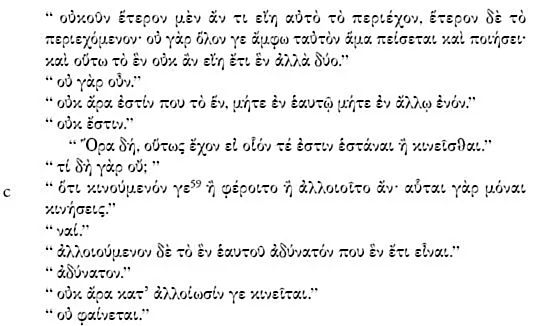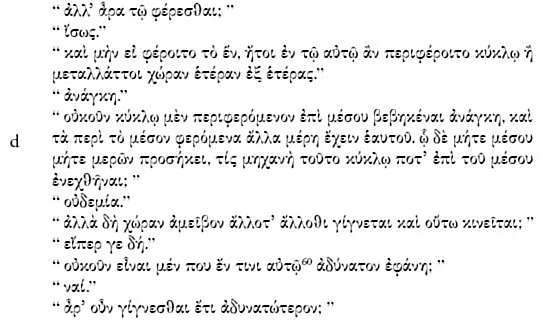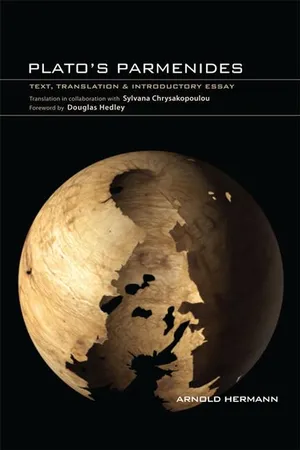eBook - ePub
About this book
Plato's Parmenides presents the modern reader with a puzzle. Noted for being the most difficult of Platonic dialogues, it is also one of the most influential. This new edition of the work includes the Greek text on facing pages, with an English translation by Arnold Hermann in collaboration with Sylvana Chrysakopoulou. The Introduction provides an overview and commentary aimed at scholars and first time readers alike.
Tools to learn more effectively

Saving Books

Keyword Search

Annotating Text

Listen to it instead
Information
TEXT AND TRANSLATION*
* From the Preface to PLATO IV, Loeb Classical Library 167: The Greek text is based upon the Codex Bodleianus or Clarkianus (B) and the Codex Venetus Append. Class. 4, cod. 1 (T). Readings not supported by either of these, and occasionally disagreements between these two manuscripts themselves, are noted in the footnotes. Later hands of these manuscripts are designated by the letters b and t. Other manuscripts occasionally mentioned are Codex Venetus Append. Class. 4, cod. 54 (G), and Codex Vindobonensis 54, Suppl. Phil. Gr. 7 (W).
FIRST ARGUMENT
“Well then,” said Parmenides, “‘if it is one’, 53 would not the one be something other than the many?”
— “How could it be [many]?”
PARTS/WHOLE
“Then, there must not be a part of it, nor can it be a whole.”
— “Why?”
“For a part is presumably a part of a whole.”
— “Yes.”
“But what is the whole? Wouldn’t that from which no part is missing be a whole?”
— “Certainly.”
“In both cases, then, the one would consist of parts, since it would be whole and would have parts.”
— “Necessarily.”
“In that way, in both cases the one would be many, rather than one.”
— “True.” [137d]
“Yet it must not be many, but one.”
— “It must.”
“Thus, if the one is to be one, it will neither be a whole nor have parts.”
— “No, it won’t.”
LIMITED/UNLIMITED
“Then, if it has no part, it would neither have a beginning, nor an end, nor a middle, for these kind of things would be parts of it.”
— “Quite right.”
“Furthermore, ‘end’ and ‘beginning’ are the limit of each thing.”
— “How could they not be?”
“Therefore, if the one has neither beginning nor end, it is limitless.”
— “Yes.”
NO SHAPE
“And consequently, it is without shape; for it partakes in neither round nor straight.”
— “How so?” [137e]
“For the round is presumably that whose extremities are everywhere equidistant from its center.”
— “Yes.”
“And straight is that of which the middle stands in between both extremities.”
— “So it is.”
“So the one would have parts and be many, if it were to partake in either a straight or a round shape.”
— “Certainly.”
“Therefore, it is neither straight nor round, since it has no parts either.” [138]
— “Correct.”
NEITHER IN ITSELF, NOR IN ANOTHER—NOWHERE
“Furthermore, being of such a kind, it would be nowhere, because it would be neither in another nor in itself.”
— “How so?”
“If it were in another, it would presumably be surrounded all around by that in which it would be contained, and it would be in contact with this thing in many places with many parts. But since it is one and without parts, and since it does not partake of all-aroundness, it cannot possibly be in contact all around in many different places.”
— “It could not.”
“Yet, conversely, if it were in itself, what contains it would be no different than itself, if indeed it were in itself, for it is impossible for a thing [138b] to be in something that does not contain it.”
— “Impossible indeed.”
“So the container itself would be one thing, and the contained another, because the same thing as a whole will not be able both to undergo and to act at the same time. And so the one would no longer be one but two.”


— “It would not.”
“Therefore the one is not anywhere, neither in itself nor in another.”
— “It is not.”
MOTION/REST
“If this is the case, consider then whether it can be at rest or in motion.” 61 —
“Yes, why not?”
“Because if it were in motion it would either change place or alter its character, since these are the only motions.” 62 —
“Yes.”
“But it is impossible for the one to alter itself and still be somehow one.” [138c]
— “Impossible.”
“So it does not move by altering its character.”
— “Apparently not.”
“But by changing place?”
— “Perhaps.”
“And yet if the one moved spatially, then it would either revolve around itself or change from one place to another.”
— “Necessarily.”
“Well, if it r...
Table of contents
- Cover Page
- Title Page
- Copyright Page
- Contents
- Foreword: The Legacy of the Parmenides
- Preface and Acknowledgements
- The Parmenides: An Introductory Essay for Readers and Interpreters
- Text and Translation
- Bibliography
Frequently asked questions
Yes, you can cancel anytime from the Subscription tab in your account settings on the Perlego website. Your subscription will stay active until the end of your current billing period. Learn how to cancel your subscription
No, books cannot be downloaded as external files, such as PDFs, for use outside of Perlego. However, you can download books within the Perlego app for offline reading on mobile or tablet. Learn how to download books offline
Perlego offers two plans: Essential and Complete
- Essential is ideal for learners and professionals who enjoy exploring a wide range of subjects. Access the Essential Library with 800,000+ trusted titles and best-sellers across business, personal growth, and the humanities. Includes unlimited reading time and Standard Read Aloud voice.
- Complete: Perfect for advanced learners and researchers needing full, unrestricted access. Unlock 1.4M+ books across hundreds of subjects, including academic and specialized titles. The Complete Plan also includes advanced features like Premium Read Aloud and Research Assistant.
We are an online textbook subscription service, where you can get access to an entire online library for less than the price of a single book per month. With over 1 million books across 990+ topics, we’ve got you covered! Learn about our mission
Look out for the read-aloud symbol on your next book to see if you can listen to it. The read-aloud tool reads text aloud for you, highlighting the text as it is being read. You can pause it, speed it up and slow it down. Learn more about Read Aloud
Yes! You can use the Perlego app on both iOS and Android devices to read anytime, anywhere — even offline. Perfect for commutes or when you’re on the go.
Please note we cannot support devices running on iOS 13 and Android 7 or earlier. Learn more about using the app
Please note we cannot support devices running on iOS 13 and Android 7 or earlier. Learn more about using the app
Yes, you can access Plato's Parmenides by in PDF and/or ePUB format, as well as other popular books in Philosophy & Ancient & Classical Philosophy. We have over one million books available in our catalogue for you to explore.
